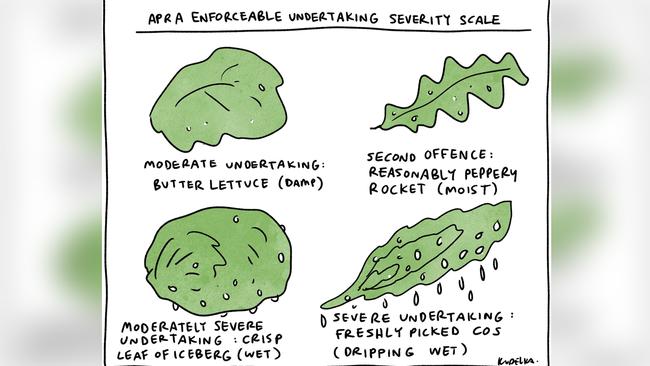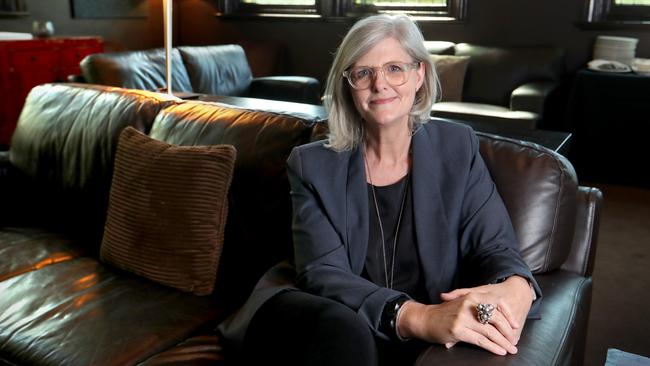Sam Mostyn’s mantra: duty, service, doing good
Sam Mostyn has built a career by making the most of opportunities and taking positions based on ‘duty and service’.

Sam Mostyn has built a career by making the most of her opportunities and taking positions based around “duty and service’’ bred into her by her army careerist father and her mother.
One of four girls, she travelled around Australia when she was young before completing degrees in arts and law at the Australian National University.
In 2005 the late Ron Evans appointed her as the AFL’s first female commissioner, a position she held for 10 years including a stint with now Victorian governor, Lynda Dessau.
It was a job she at first took reluctantly but was encouraged to join by her father.
“I grew up around a notion of service,” she says.
Mostyn now says: “I was a quota position and I’m proud of it.”
“It was unconscionable” for the AFL not to have any women in its ranks, she says.
Once on the board, she quickly became the source of attention for other women, women’s football and the indigenous community.
There is now only one female commissioner, Gabrielle Trainor, but Peggy O’Neal is Richmond president.
Woman’s football is now established and the game’s culture will inevitably change.
Mostyn tells the story of taking former AFL president and former Carlton captain Mike Fitzpatrick to a change room of a women’s team, when he said: “I can’t go in there.”
She talked him into it and he quickly found “you know they talk about the same stuff we used to”.
Mostyn breaks barriers seemingly without trying and in the process, joins the likes of director Diane Smith Gander, who also declares herself as a “quota director” at Wesfarmers, adding “to say so publicly is liberating”.
Mostyn said recently: “The more you remove the idea of a minority status, the more you force that person to be a whole person.”
She now sits on a string of corporate boards among other not-for-profit positions including Virgin, Transurban, Citibank and Covermore Insurance.
It’s all a long way from her days as a law student. While she worked in the magistrate’s court as a student and liked the courts, “I had no plans to be a lawyer. It was a good basic degree.”
It was also different from dentistry, which a counsellor had suggested as a career.
One of her early breaks was to work as an associate to the then Court of Appeals president Michael Kirby, who hired a male and a female as his associates.
“It was an active decision of his” for which she was grateful.
“I’ve always wanted to work with people with a higher purpose. If you have a choice, use it well and make yourself useful.’’
After being an article clerk at Freehills, Mostyn joined the then young firm Gilbert & Tobin, where she enjoyed the culture and wider sense of purpose espoused by the likes of Danny Gilbert.
From there she went to work for then prime minister Paul Keating, another defining part of her career.
“He had a national curiosity and understanding of how society works and was courageous in his decisions,” she says.
Her fields were communications, environment and sports policy and the work gave her a close insight and in the process high respect for senior public servants.

The policy role was one she thoroughly enjoyed: “I was lucky be in government at a time when big things were happening.
“Good leaders understand they have to take a stand and if they have to break the rules to do it, they will.”
She said Keating was supportive and generous. “He really cared about your future after working for him.”
Working for the prime minister opened doors while also satisfying her wish “to try to do something good”.
This was also the reason why she accepted the call from Optus Vision’s Geoff Cousins to join him in building out a new broadband company.
“Gender wasn’t an issue. He just wanted creative people,” she says.
It was also a decision like many in her career in which she decided that “if there is an opportunity, make the most of it and don’t let an opportunity pass that gives you the chance to do something good”.
This was the infamous cable rollout in which Optus and Telstra were going head to head, street corner to street corner, in an expensive and ultimately failed experiment.
“The tactics around the cable rollout were extraordinary and you had to just keep your head and try to do the right thing,” she says.
There were heady days in which the cable companies were stringing up new wires on streets and you had to “lock in the community behind you, try to build trust”.
Optus was the ultimate challenger brand and eventually, then chief “Dial a Deal” Dick Brown talked her into moving to London to head the company’s British human resources team.
This was a new challenge and Mostyn reached out to the experts in the game, including Westpac’s Anne Sherry who “taught me the basics”.
“I was in the front row seat of what was then the early days of HR in Australia,” Mostyn says.
Brown was a mercurial character and the process taught her a lot about board rooms.
“I learned at close range you need to have the right people on the board, the right chief executive and the right teamwork,” she says.
The AMP upheaval highlights the chemistry within boards and the need for new directors to do as much diligence on his or her colleagues as the board may do on them.
After returning to Australia with a young daughter, Mostyn surprised herself by accepting a job at IAG with former Wallaby Michael Hawker, who talked her into accepting a role.
“We had a two-hour debate about what is good and what a company can do to promote goods things.”
As head of culture and reputation, she had to get staff from a mutual organisation to accept the concept of making a profit, the role of a company in taking risks and in doing so making money and also improving society.
“Michael asked me, ‘Are you saying bad people run companies? Good people do as well’.”
Under Hawker, IAG set new standards on the environment with help from the likes of David Suzuki and Al Gore, who helped create the belief that a sustainable company was an achievable goal.
Sam Mostyn’s career path has covered extraordinary diversity in work but is bound in a common goal of “connecting with fascinating people to make sense of it all” and a genuine belief in “duty and service with the purpose of doing good things”.




To join the conversation, please log in. Don't have an account? Register
Join the conversation, you are commenting as Logout